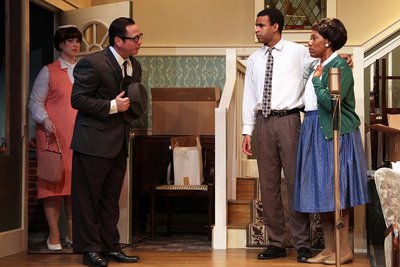
A witty, often biting examination of neighborhood integration, white flight, gentrification and just how far we have not come in the last half century, Clybourne Park is playwright Bruce Norris’ 21st-century response to Lorraine Hansberry’s A Raisin in the Sun, in which a black family plans to move into a white neighborhood. Norris’ play, now at Oregon Contemporary Theatre, takes Hansberry’s tale of balancing assimilation and heritage full circle as white professionals return with grand plans to the neighborhoods their grandparents fled.
In the first act, we view Hansberry’s story from the point of view of the all-white neighborhood association. The second act takes place 50 years later when the neighborhood association, made up of African-Americans, takes issue with a white couple’s plans for a historic home. The problem? Literally, the house they’ve designed is too tall. Metaphorically, ethically, spiritually and politically, the problem is a bit more complex.
Clybourne Park tears into our fears, our inability to talk about race and the emotions we bring to real estate. This both laugh-out-loud funny and gut-wrenchingly painful script won the Pulitzer Prize for drama.
Director Craig Willis has put together a beast of a cast, drawing members from throughout the Willamette Valley. Each cast member is charged with two different characters, in two different eras. The modern characters often have shades of former characters, indicating a similar soul born to another era.
Donella-Elizabeth Alston reveals powerful undercurrents of frustration, expressed by an eloquent physicality in her performance as Francine/Lena.
First a 1950s homemaker, then a 2009 lawyer with a penchant for foreign capitals, Storm Kennedy is hysterical as Bev/Kathy. Her humor buoys up the audience just as the darkness of the plot threatens to pull us under.
Robert Hirsh is powerful as the grieving Russ, and likable as Dan. Cloud Pemble handles the language of his characters nimbly, giving a hearty performance. Jonathan Thompson as Albert/Kevin brings a self-assured charm to two of the play’s more likable characters. Jason Rowe delivers white male privilege in all its complex ugliness in two eras as Karl/Steve.
Clybourne Park’s home in question develops its own character in the accomplished hands of set designer Jeffrey Cook. Beginning the evening as an elegant abode, the house finishes the night as a trashed and graffitied old place awaiting destruction. Like other characters in the play, the house retains its original soul, which hangs in the balance as fear and prejudice pulse through it.
Clybourne Park is timely and timeless, a painful and funny illustration of how everything, and nothing, has changed. This play will make you laugh so hard your sides hurt, but you will continue hurting long after the laughter subsides and the play’s deeper message seeps in.
Clybourne Park runs through June 1 at Oregon Contemporary Theatre; info and tickets at octheatre.org